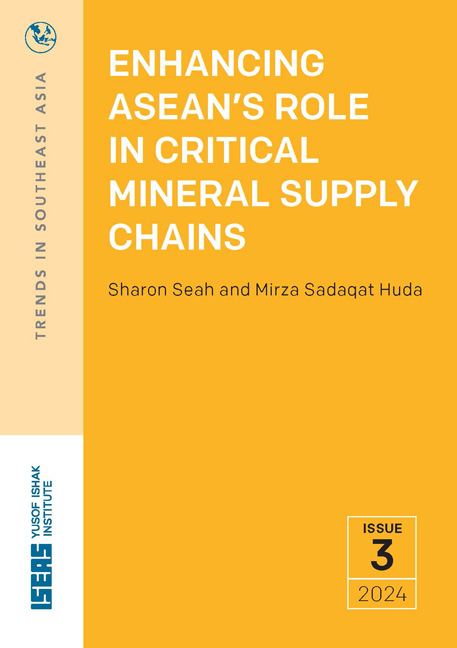Enhancing ASEAN’s Role in Critical Mineral Supply Chains
Published online by Cambridge University Press: 17 April 2024
Summary
INTRODUCTIONAn energy transition is underway in Southeast Asia. This process is dependent on an uninterrupted supply of the minerals and metals that are essential to produce low-carbon technologies. These raw materials are termed ‘critical minerals’ (CMs), owing to three broad features: their necessity as inputs in low-carbon technology, the lack of viable substitutes, and significant supply constraints. The demand for CMs such as lithium, nickel, cobalt, rare earth elements (REEs), copper, and silicon3 is expected to increase exponentially in the coming decades. To meet the global net zero target by 2050, mineral inputs will need to increase sixfold by 2040, compared to current levels. According to scenarios developed by the International Energy Agency (IEA), the demand for minerals used in electric vehicles (EVs) will increase thirty times compared to current levels, while mineral requirements for low-carbon energy generation will triple by 2040.
The development of CMs is impeded by several supply constraints. Currently, a handful of countries dominate the CMs market, with China playing an outsized role in both the upstream and downstream parts of the supply chain. For example, China currently extracts 65 per cent and processes 85 per cent of the world's REEs. The largest amount of copper, nickel and cobalt are extracted in Chile, Indonesia, and the Democratic Republic of Congo (DRC), respectively. Yet, as shown in Figure 1, China dominates the processing of all three minerals, as well as alumina and lithium.
There is growing academic and policy consensus on the need to develop sustainable and reliable supply chains for CMs, which is of great relevance to Southeast Asia. On the one hand, the region can become a major supplier of critical minerals, due to the existence of substantial deposits of bauxite, nickel, tin, REEs, cobalt, manganese and graphite. On the other hand, Southeast Asia is likely to become a significant consumer of critical minerals, owing to the region’s growing solar photovoltaic (PV) and electric vehicle industries. Malaysia and Vietnam are the world’s second and third-largest solar PV manufacturers and accounted for one-fifth of global shipments in 2020.9 Thailand has become the region’s leading producer of EVs, while the Philippines and Indonesia have undertaken initial steps to develop integrated battery and EV supply chains.10
- Type
- Chapter
- Information
- Publisher: ISEAS–Yusof Ishak InstitutePrint publication year: 2024



